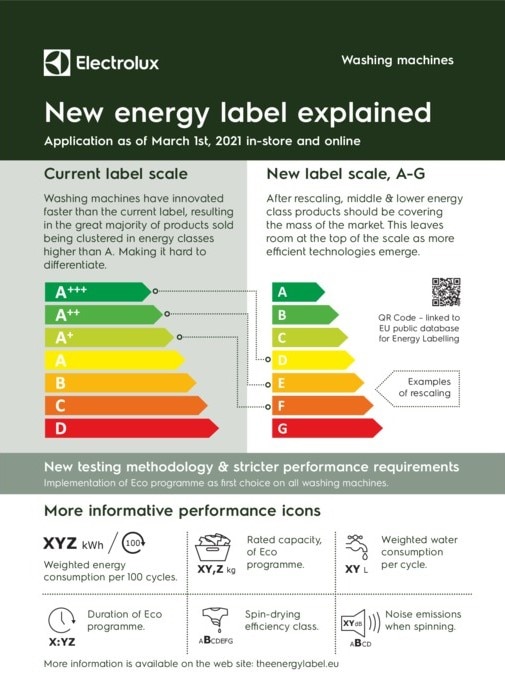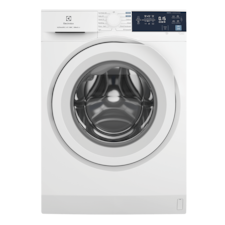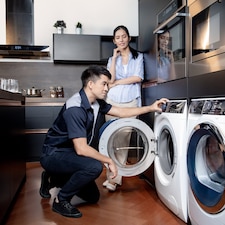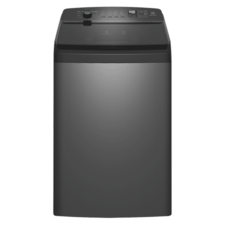Load capacity, size, and types are key things to consider while choosing a washing machine but what else? Explore our comprehensive selection guide to gain invaluable insights into what to prioritize before making a purchase.
1. Tips on choosing washing machine capacity
What does washing machine capacity mean?
When it comes to how to choose a washing machine that is good and durable, understanding the concept of washing capacity and how it is determined is crucial.
The washing capacity of a washer simply refers to the maximum amount of clothes in kg can be washed in one cycle. The washing capacity is always measured by the weight of the dry laundry. For example, a 7kg washing machine means it can load up to 7kg of dry clothes in each cycle.

How to choose washing machine capacity by family size
Now that you have an idea of what washing capacity is, here is a brief guide on how to find out how many kg of a washing machine you will need according to family size:
|
Washing machine capacity (kg) |
Family size |
|
6-7kg washing machines |
Singles or couples |
|
7-8kg washing machines |
2-3 members |
|
8-9kg washing machines |
3-5 members |
|
10+ kg washing machines |
5+ members |
While this capacity guide is easy to follow, you may find yourself wondering, "What if I have a small family of two, but we typically have heavy-duty loads for each cycle?" Let's explore our solution in the upcoming section.
How to choose washing machine capacity by average laundry load
Another effective way in determining the appropriate washing capacity of the washer for your home is to weigh the average load of clothes you usually wash in each cycle. This might sound obscure to some, yet it’s practical in helping you select a washing machine with a suitable load capacity.

Traditionally, it is recommended to opt for the minimum washing capacity for your needs. However, as most of latest washing machines come with intelligent sensor technology that adjusts water levels, you can confidently opt for a higher capacity without having to sacrifice efficiency.
2. Washing machine load capacity
Now that you know how to choose the right washer based on washing capacity, it’s time to talk about load capacity or load size chart. Load capacity is basically about how many pieces of clothes you can put in your washing machine in each cycle.
Here is a brief guideline on washing machine capacity and the corresponding number of clothes it can load for your reference:
|
Washing Machine Capacity |
How many clothes |
|
6-7kg washing machines |
20 clothes |
|
7-8kg washing machines |
30-35 clothes |
|
8-9kg washing machines |
40 clothes |
|
10+ kg washing machines |
50 clothes |
To give you a more itemized idea, here is a breakdown of what various load sizes might look like:
|
Load capacity |
How it might look like |
|
20 clothes |
2 shirts, 2 trousers, 2 bath towels, 2 hand towels, 2 pillow covers, 1 large bedsheet |
|
30-35 clothes |
2 shirts, 2 pairs of denims, 2 pairs of children’s jeans, 2 bath towels, 2 pillow covers, 2 bedsheets |
|
40 clothes |
3 shirts, 3 pairs of adult denims, 3 small towels, 3 pillow covers, 3 bath towels, 2 bedsheets |
|
50 clothes |
4 shirt, 4 pairs of adult denims, 4 small towels, 4 bath towels, 4 pillow covers, 3 bedsheets |
3. Washing machine sizes
Besides washing capacity and load capacity, you must also consider the washing machine size or dimension. The washing machine you choose must accurately fit within the allocated space.
To select the ideal washing machine for your home, be sure to follow these steps:
- Measure the space where you intend to place the washer.
- Take note of the dimensions.
- Choose a washer that fits within that space.
Here is a washing machine size chart showing common dimension ranges of a normal washing machine:
|
Washing machine type |
Width |
Height |
Depth |
|
Top load washing machine |
540 to 600 mm |
850 to 960 mm |
540 to 606 mm |
|
Front load washing machine |
565 to 600 mm |
840 to 850 mm |
400 to 615 mm |
|
Small washing machine |
385 to 430 mm |
575 to 840 mm |
366 to 465 mm |
Important notes:
- Remember to leave a gap of approximately 25 mm on both sides of the washing machine. This extra space facilitates proper ventilation and minimizes overheating and vibration.
- Allocate an additional 150 mm of space behind the washer for hoses and venting purposes.
- Allow for at least 500 mm of extra depth for front-loading washers or height for top-loading washers to ensure there is enough space when the lid is open.

4. Types of washing machines
In the previous section, we mentioned the common size ranges of washing machines. However, it is also important to consider the different types of washing machines and determine which type best suits your needs. Here is a guide to help you understand the various available options.
Washing machines are typically categorized into two types based on the number of functions and the level of manual work involved:
Semi-Automatic or Twin Tub Washing Machine
Semi-automatic washing machines, also known as twin tub washers in Indonesia and some markets, typically consist of two tubs—one for washing and another for drying.
This configuration requires a significant manual labour, as you need to place your clothes in the washing tub first and then manually transfer the washed laundry to the drying tub.
Fully Automatic or Single Tub Washing Machine
In contrast, fully automatic or single tub washing machines automate the entire washing process, requiring minimal human intervention. As the name implies, this type of washing machine features a single tub for both washing and drying.
Depending on where clothes are loaded, fully automatic washing machines are divided into two types as follow:
- Top load washing machine: Washing tub sits vertically in the machine and laundry is loaded from the top.
- Front loading washing machine: The drum sits vertically in the machine and laundry is loaded from the front.
Compared to top loaders, front loaders are equipped with more advanced features such as a function to pre-soak and distribute laundry items evenly, a sensor technology to automatically adjust water levels based on actual washing load, and an advanced child lock.
Below are two comparison articles you might want to read for more details:
- 6 differences between single tub and twin tub washing machines
- 10 differences between front load and top load washing machines
5. Set your budget
Many people believe that choosing a basic top-load washing machine is a suitable option for those constrained by budgetary considerations. This perception holds some truth, given that top loaders often come with affordable price tags and sufficient features to fulfil their purpose.
In contrast, front loaders generally have higher upfront costs. However, the initial investment in a front load washing machine can quickly be offset by long-term savings due to their superior energy and water efficiency.
Explore our collection of Electrolux automatic washing machines, which are available at affordable prices and incorporate the latest washing technologies to ensure high energy efficiency:
- No more visible detergent residue with UltraMix*.
- HygienicCare removes 99.9% allergens and germs*.
- EcoInverter motor uses 50% less energy*.
- UltraEco uses 70% less energy*.
- Set quick cycles to suit your schedule.
- Add clothes up to 15 mins after the cycle starts.
- Fuzzy logic adapts settings for great results.
- Quick cycles for single items or small loads.
- Durable lid closes silently and safely.
- UltraMix prevents visible detergent residue*.
- PowerJet ensures perfect washing and cleaning.
- ActiveFlow lifts clothes to prevent tangling.
6. Material of washing tub or drum
The washing tub or drum is typically constructed from stainless steel, plastic, or porcelain-enamel materials. Among these options, stainless steel washing machine tubs are considered the best choice due to their ability to withstand high spin speeds and their durability.
Regarding the other two, plastic washing tubs have a longer lifespan compared to enamel tubs, which can be susceptible to chipping and rusting.
7. Spin speed or RPM (rounds per minute)
If you are wondering which RPM is good for each type of washing machine, here is a brief rule of thumb:
- For front load washing machines, anything above 1000 RPM is considered good.
- For top load washing machines, anything above 850 RPM is considered good.
Below is a table that provides a breakdown of the ideal operating RPM for different types of fabric:
|
|
Front Load Washing Machine |
Top Load Washing Machine |
|
Frail clothes |
400 – 600 RPM |
300 – 400 RPM |
|
Wool items |
700 – 900 RPM |
400 – 500 RPM |
|
Synthetic items |
800 – 1000 RPM |
500 – 600 RPM |
|
Jeans & Thick items |
900 – 1200 RPM |
600 – 1000 RPM |
>>> Related post: 10 easy tips on how to take good care of clothes
8. Energy efficiency index (EEI)
It's important to select a washing machine that consumes less power and water as this will result in long-term cost savings.
Since 2010, a new EU energy rating system has been introduced which utilises the energy efficiency index (EEI) to classify washing machines. The ratings range from A-30% (or A+++) to D, with A-30% representing the highest efficiency and D being the least efficient. It is advisable to purchase a washing machine with an EEI of at least A-10% (or A+) to ensure optimal energy efficiency.

Good news: All Electrolux washing machines are energy efficient, boasting ratings of A-30% and higher. For example, some Electrolux energy efficient washing machines are even rated at an impressive A-50% in terms of energy efficiency.
9. Pick your top 3 favourite brands
Consider well established home appliance brands known for their high-quality products, those that align with your sustainability values, like Electrolux Indonesia. Visit their websites and physical stores to deepen your understanding. Afterwards, lock in on your top three favourites, and carefully compare each one according to your own criteria.
Most forget the importance of having an easily accessible customer service centre or hotline. Always make this a non-negotiable. It adds to your peace of mind when you can easily run to someone for repairs and warranties.
The choice of the best washing machine to buy should depend on your laundry habits, budget, and personal needs. However, when you opt for an Electrolux washing machine, you can be confident that you are investing in an automatic laundry machine that will reliably serve your family for years to come.

10. Washing machine features to look for
The latest washing machine technologies are designed to provide optimal cleaning performance and make your life easier. If your top priorities are maximum convenience and achieving the best possible clean, here are some key features to look for when buying a washing machine:
Pre-soak feature
This function pre-soaks and distributes clothing items evenly. Rest assured that every fibre is reached and every item feels soft and smells fresh for longer.
Delicate care program
This is a specialised program to protect your treasured garments, using a reverse cradle action, for a reduced wrinkle wash.

Automatic mixing of detergent and softener
This function is designed to protect every fibre by optimally blending water, detergent and softener before entering the drum, conserving the life of your clothes.
Automatically-tailored washing programme
This feature automatically optimises the programme for the actual laundry load to save resources and avoid over washing. Smart sensors save the time, water and energy used, while ensuring even small loads are washed with precision.

Vapour spray to soften fabrics
This technology adds a gentle spray of vapour to soften fabrics at the end of each cycle. Water vapour combined with a high-performance wash programme helps to remove bacteria from garments gently yet effectively.
Self-cleaning feature
Self-clean function helps to maintain the performance of your washing machine if run on a regular basis.
For deep cleaning, you might want to consider professional support from the brand of your washer. Electrolux Indonesia offers authorized in-home cleaning and maintenance services for washing machines. In addition to a thorough deep cleaning, you will also receive useful advice on how to set a cleaning cycle on the washer for future self-maintenance.
- Our technician visits you to clean your appliance.
- Essential cleaning, and self-maintenance advice.
- Clean and maintain for lasting performance.
- StainCare removes 40 different visible stains*.
- UltraMix prevents visible detergent residue*.
- PowerJet ensures perfect washing and cleaning.
- CyclonicCare gives gentle yet powerful cleaning
- Prism Drum minimizes friction and tangling
- TubClean keeps your machine hygienically clean
- AutoDose for precise dosage, less wear and tear*.
- SensorWash with AI removes 49 different visible stains*.
- No more visible detergent residue with UltraMix*.
>>> Find below our expert tips for washing machine owners:
- How to use a single tub washing machine
- How to clean a single tub washing machine
- How to wash a jacket in the washing machine
11. Consult reviews and ratings
One of the most valuable tools for assessing a washing machine, or any other products, is unbiased, first-hand accounts from other customers, allowing you to gauge its performance, strengths, and authenticity of claims.
Seek out in-depth reviews, including articles and videos, that thoroughly evaluate each aspect of the washing machine. As a reference, Electrolux Indonesia offers a selection of washing machines with numerous reviews and high ratings.
Some of our most highly rated washing machines are the 8kg front load washing machine EWF8004E3WB and the 9kg front load washing machine EWF9024D3WB.
Make the most of our Store locator tool to find the nearest stores in your area where you can purchase Electrolux washing machines. By visiting these stores, you will have the opportunity to view our washing machines and other high-quality home appliances in person, receive expert and personalised advice, make an informed purchase, and much more.
12. Washing machine FAQs
-
What is the size of a small washing machine?
Small washing machine’s common dimension ranges are from 385 x 575 x 366 mm to 430 x 840 x 465 mm (WxHxD).
-
How to find out how many kg washing machine do I need?
You can choose a washing machine by family size or average laundry load. You can refer to our section about tips on choosing capacity of the washing machine for more details.
-
How many clothes can be put in a 7kg washing machine?
A 7kg washing machine can fit up to 20 clothing items.
-
How many clothes can be put in an 8kg washing machine?
An 8kg washing machine can fit up to 35 clothing items.
-
What are the differences between a 7 kg and 8 kg washing machine?
Key difference between a 7kg washing machine and 8kg washing machine is the number of clothing items can fit in each load cycle. An 8kg washer can load about 5 more pieces of clothes.
-
What capacity of machine is suited for couples?
6 to 7kg washing machines are good choices for couples or singles.
-
What washing machine size is suited for a family of 5?
A family of 5 members should choose a washer with a washing capacity of at least 8 to 9kg.
-
How do I choose the correct washing machine settings?
Most washing machines have similar features as follows:
● Regular/Normal Cycle: Advisable for whites, sportswear, underwear, socks and T-shirts. Though efficiently removing stains, Normal Cycle may cause coloured clothes to fade due to strong agitation speeds and hot water.● Delicates: For lightweight and delicate clothes. Make sure to check the labels as some delicate clothes are “dry-clean only”. This feature is advisable for cotton blend sweaters, linen shirts and dri-fit sportswear.● Heavy Duty: This is recommended for heavily soiled clothing and muddy items. Heavy duty cycles offer longer, warmer washes and high-speed tumbling to make sure all the dirt is flushed out and removed. -
Can I add clothes to the front loader washing machine after the cycle has started?
It is now possible to add clothes mid-cycle with ’Pause and Add Clothes’ function which is available on most Electrolux washing machines. After pressing the button, wait for the door to unlock, add your items and press ’Start/Pause’ to recommence the wash cycle.










